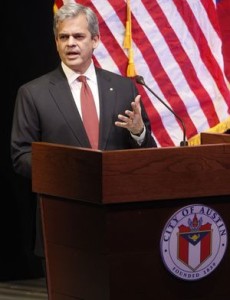“Great cities do big things not because they are great. Cities become great because they do big things.”
Thank you, President Fenves. I am grateful for your leadership at the University of Texas and for our growing working relationship and even friendship.
And with the conversations that need to be happening between UT and the City on issues like the development of the Innovation Zone around our new medical school, a replacement arena for the Drum, the future of the MUNY golf course site, as well as expanding opportunities for closer connection between Austin and the incredible intellectual resources of your faculty, there’s a lot for you and me — and the community — to be talking about.
And by the way, I’m grateful to you for skipping the West Virginia game tonight. You get pretty good seats, so I know what kind of sacrifice this is.
President Fenves recounted the story of the Austin Dam. I love that story, because as the Mayor of Austin I’m often asked what the secret sauce is that makes us a magical city and a center for innovation and creativity. Most every other city wishes it could replicate our success. When I attended the climate change talks in Paris, the 100 Resilient Cities meeting in London, the Almedalen Political Rhetoric Festival in Norway, and the traffic control center in Dublin, Ireland, and people found out that I was the Mayor they’d get a big smile on their face and tell me how much they love Austin.
Cities from all over our country and the rest of the world send entire delegations here to troop through our offices in hopes of finding the magic formula written on a white board somewhere. These leaders from other cities ask me what makes Austin so special. I tell them about Barton Springs and how our commitment to our environment became perhaps our most important asset. I tell them about Willie Nelson and our live music, how by embracing diverse cultures we established an inclusive community where creativity thrives, about a community where it is okay to fail so long as you learn and grow. And I tell them about Michael Dell reinventing the assembly line in his dorm room and how coming up with radical new ideas here doesn’t make you an outcast — it can make you rich and famous.
And then I tell them about the Austin Dam, and how when the dam burst we were set on a path that turned us into a boomtown of the Information Age. The lesson, I tell these visitors from other cities is clear. They need to leave Austin, return to their hometowns, and destroy all their dams and bridges, too.
But some cities just aren’t willing to do the Big Things.
Continue reading after the break.
Continue reading →
 Mobility ATX just posted the #YearOfMobility section of the State of our City address. I love Mobility ATX. It’s like Reddit for Austin public policy nerds, and it encourages productive discussion which is exactly what we need to have right now. As I said in the speech on Tuesday, we need to do big things on I-35, transit, bikes and rail, or we’re just going to end up like Los Angeles. (In fact, traffic on I-35 has gotten so bad that people in Houston feel sorry for us now.) And while work is ongoing on sidewalks, street lights, and crossing signals, we need to get a lot of public input now before we consider what projects we put before the voters as soon as November. So read up and spout off.
Mobility ATX just posted the #YearOfMobility section of the State of our City address. I love Mobility ATX. It’s like Reddit for Austin public policy nerds, and it encourages productive discussion which is exactly what we need to have right now. As I said in the speech on Tuesday, we need to do big things on I-35, transit, bikes and rail, or we’re just going to end up like Los Angeles. (In fact, traffic on I-35 has gotten so bad that people in Houston feel sorry for us now.) And while work is ongoing on sidewalks, street lights, and crossing signals, we need to get a lot of public input now before we consider what projects we put before the voters as soon as November. So read up and spout off.
 ed on Feb. 19, 2016
ed on Feb. 19, 2016